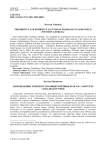Этнография. Рубрика в журнале - Материалы по археологии и истории античного и средневекового Причерноморья

Prohibitive and inhibitive factors of marriage in Samegrelo (Western Georgia)
Статья научная
Social relationships, including marriage, were regulated by ecclesiastical and secular laws as well as by customs in Georgian society. Various kinds of prohibitions existed. Today majority of the customs are lost because of globalization. However, customs concerning marriage restrictions are relatively well preserved in people’s memory. Different clans that do not marry each other were revealed by the ethnological research in historical-ethnographic region of Georgia - Samegrelo. Breaking marriage restriction by different socially related groups was strictly prohibited. Moreover, in some cases, clans or lineages which became relatives artificially had to follow the same strict rules of marriage prohibition. Different clans, lineages and patronymies studied by the ethnographic research conducted on the field, revealed the strength of the customs even today. The result of the research revealed, that prohibitive factors of marriage between different clans, lineages or patronymies were customary rules in Samegrelo, such are “ ginochama ”, serving to the same shrine, becoming relatives via Christianity and etc. However, marriage prohibition determined by Christianity affected only to minor lineages and patronymies rather than the big ones or clans. The memory of common origin is inhibitive factor of marriage, but not prohibitive similarly to the memory of past social inequality.
Бесплатно

